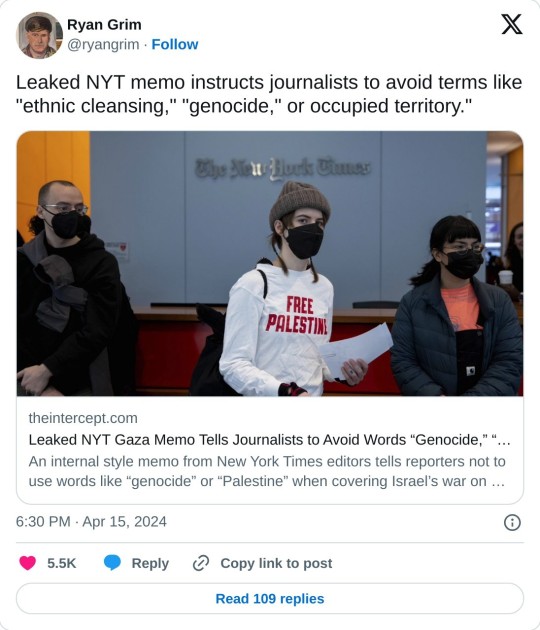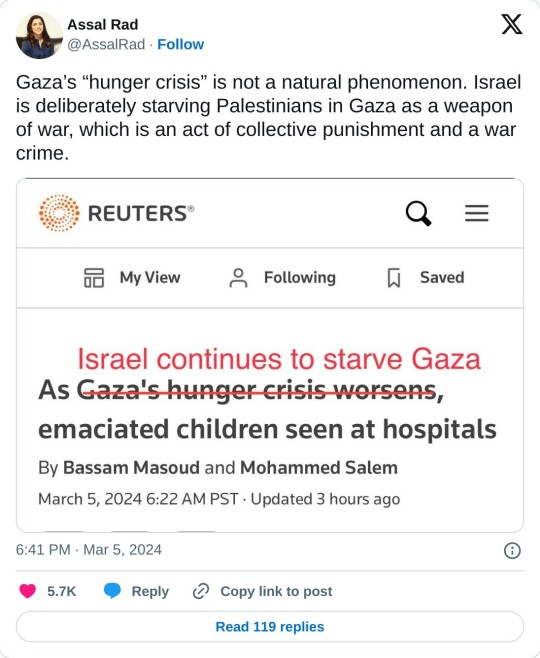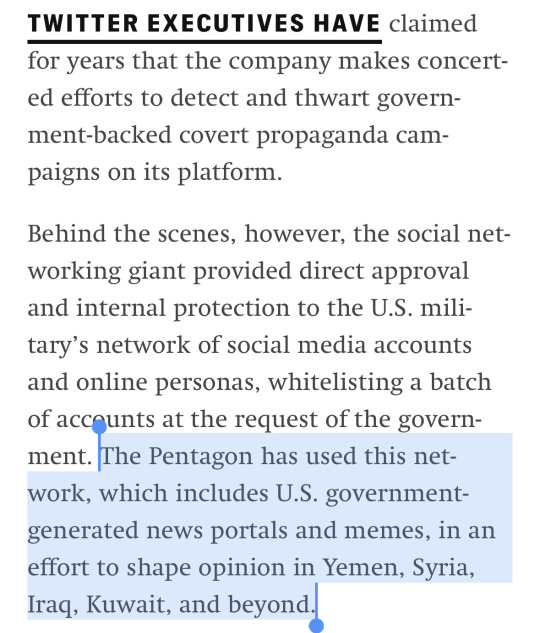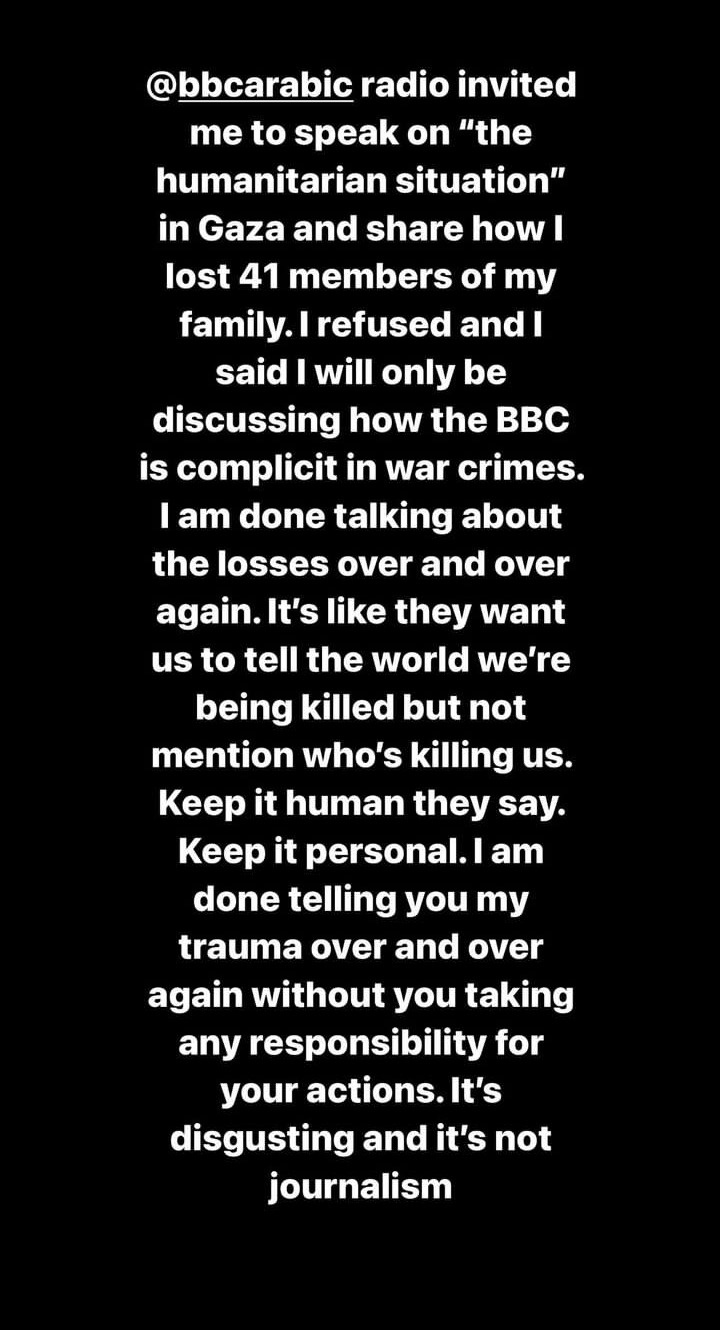Text

THE NEW YORK TIMES instructed journalists covering Israel’s war on the Gaza Strip to restrict the use of the terms “genocide” and “ethnic cleansing” and to “avoid” using the phrase “occupied territory” when describing Palestinian land, according to a copy of an internal memo obtained by The Intercept.
The memo also instructs reporters not to use the word Palestine “except in very rare cases” and to steer clear of the term “refugee camps” to describe areas of Gaza historically settled by displaced Palestinians expelled from other parts of Palestine during previous Israeli–Arab wars. The areas are recognized by the United Nations as refugee camps and house hundreds of thousands of registered refugees.
The Times memo outlines guidance on a range of phrases and terms. “The nature of the conflict has led to inflammatory language and incendiary accusations on all sides. We should be very cautious about using such language, even in quotations. Our goal is to provide clear, accurate information, and heated language can often obscure rather than clarify the fact,” the memo says.
“Words like ‘slaughter,’ ‘massacre’ and ‘carnage’ often convey more emotion than information. Think hard before using them in our own voice,” according to the memo. “Can we articulate why we are applying those words to one particular situation and not another? As always, we should focus on clarity and precision — describe what happened rather than using a label.”
Despite the memo’s framing as an effort to not employ incendiary language to describe killings “on all sides,” in the Times reporting on the Gaza war, such language has been used repeatedly to describe attacks against Israelis by Palestinians and almost never in the case of Israel’s large-scale killing of Palestinians.
End your New York Times subscription
4K notes
·
View notes
Text
Everybody hates on paywalls but they've saved me from reading so many NYT articles 🫂
12K notes
·
View notes
Text
incredible work from writers, journalists and historians coming together to critique the new york times' (and essentially all mainstream american media) coverage of the genocide in gaza.
10K notes
·
View notes
Text
Into the depleted field of journalism in America, a handful of websites have appeared in recent weeks with names suggesting a focus on news close to home: D.C. Weekly, the New York News Daily, the Chicago Chronicle and a newer sister publication, the Miami Chronicle.
While Russia has long sought ways to influence public discourse in the United States, the fake news organizations — at least five, so far — represent a technological leap in its efforts to find new platforms to dupe unsuspecting American readers. The sites, the researchers and officials said, could well be the foundations of an online network primed to surface disinformation ahead of the American presidential election in November.
#journalism#russia#it goes into how the fake stories get reposted on social media#just a reminder to always check your sources!
0 notes
Text
UPDATE: it was so good omg, i learned so much! will try to share my main takeaways/some resources
going to a solidarity journalism workshop today! so excited to learn more about the practice & how to incorporate it into my every day
1 note
·
View note
Text
going to a solidarity journalism workshop today! so excited to learn more about the practice & how to incorporate it into my every day
1 note
·
View note
Text
Lit Hub has posted an article with the names, photos and biographies of the Palestinian poets and writers killed by the IOF since the beginning of October. May we remember them, their names & their poems 🍉🕊🍓🪁
"Since October 7, Israel has killed at least thirteen Palestinian poets and writers in Gaza.
If we think of ourselves as a global literary community, then these people were our fellow travelers, our peers.
They—just like the more than 66 Palestinian journalists killed in Gaza in the line of duty; just like every one of the more than 21,000 innocent people massacred in Gaza, the West Bank, and Israel over the past 75 days—deserve to be remembered."
8K notes
·
View notes
Text
During the most recent conflict in Palestine/Israel, which has seen the killing of 11,000+ Palestinians and 1,200 Israelis, the three largest US news media channels have displayed a clear and quantifiable bias in favor of Israel in its war on Gaza. Without any further editorializing, let’s take a look at 5 key findings that demonstrate this:
IDF spokesman Peter Lerner was interviewed 44 times on CNN, MSNBC and Fox News in the span of 30 days and given free rein to mislead and distort with little to no pushback.
Israelis are mentioned more than Palestinians every day on CNN, MSNBC, and FOX. This remained the case even as Palestinian deaths began to far outpace Israeli deaths.
The news apparently gets to decide what is (and what is not) a ‘massacre’. According to the three channels, only Israelis were massacred.
The ~230 hostages got more coverage on CNN and Fox News than the 11,000+ Palestinians killed by Israel.
By October 24, more than 3,000 Palestinian children had been killed. They were mentioned less than the ~30 children among the 1,200 total Israelis killed by Hamas.
#palestine#free palestine#journalism#I pulled the 5 findings out but there's no paywall so pls check out the rest of the piece!#the charts are especially helpful
30 notes
·
View notes
Text
”this wasn’t reported on the news” and “I did not read the news” are not the same thing
3K notes
·
View notes
Text
it's always interesting reading about people's career paths and how they ended up at their current role
1 note
·
View note
Text
As protests erupt worldwide against Israel’s ferocious bombardment and ground invasion of Gaza, which has claimed the lives of more than 10,000 Palestinians (Reuters, 11/6/23), US media ponder how all of this impacts Jewish people. Sadly, the way this is often framed completely mischaracterizes Jewish opinion and the pro-Israel movement, falsely acting as if Jewish opinion is unquestionably unified in support of Israeli military attacks and in opposition to Palestinian rights.
[...]
A Washington Post report (10/31/23) on the Jewish response to pro-Palestinian protests on campuses stated, as a factual observation, that “Jewish students hear ‘the river to the sea’ as an open call for the eradication of Israel, a haunting proposition given the legacy of the Holocaust that led to Israel’s creation.”
There are a few problems here. One, it is hardly established that the American Jewish student body is monolithic on this issue. College groups that support Palestinian rights often include Jews; in fact, FAIR (5/22/23) reported how a Jewish staffer at the AP was forced out of her job because of her past pro-Palestinian advocacy in college. Two, the phrase “the river to the sea” is often mischaracterized, as it refers to a one-state solution, not anyone’s deportation.
However, to back up this assertion, the Post quotes Jonathan Greenblatt, the CEO of the pro-Israel Anti-Defamation League, saying that while “there’s nothing wrong with advocating for a Palestinian state,” there is also “nothing wrong with advocating for a two-state solution.” However, he says, “there’s something profoundly wrong with advocating for a final solution.”
The “final solution” is a reference to the Jewish Holocaust, or Shoah. But many Jews and non-Jews alike advocate for a one-state solution where all people have rights, regardless of their religion or ethnicity. It is intellectually dishonest for the Post to quote a pro-Israel partisan to assert that the choice for Jews is between a two-state solution and Auschwitz.
For example, in the post-Brexit economy, the idea of Irish reunification is becoming more and more real (Guardian, 10/6/22). Yet no one would seriously characterize the Republic of Ireland absorbing the North as a Protestant genocide. Nor were white residents of South Africa exterminated or forced to emigrate when their country turned to a democratic one-person-one-vote system.
291 notes
·
View notes
Text
'The A-B-C-Ds of surviving and thriving as a journalist'
Actively manage your career
Build strong networks
Continually educate yourself
Develop your understanding of the business
0 notes
Text
Reblog, Reblog, Reblog
#the end stuck with me the most#there are so many pieces from publications that I respected that started off with calling this a “complex” issue#and to see them say that was so eye-opening
5K notes
·
View notes





